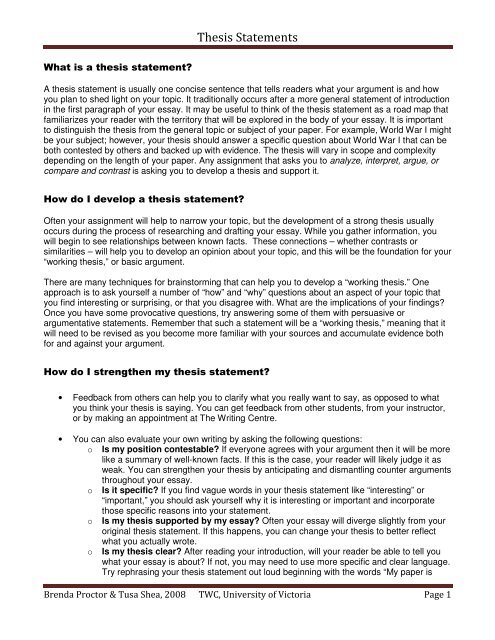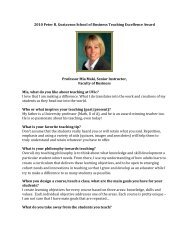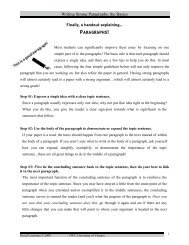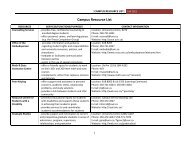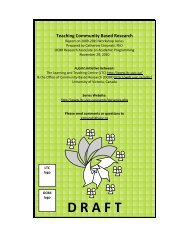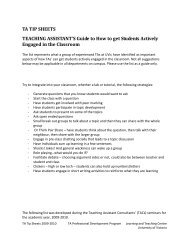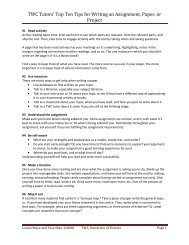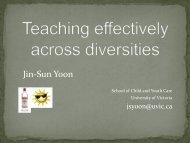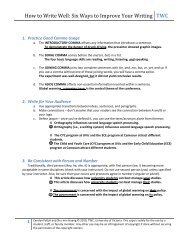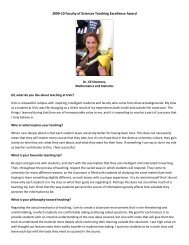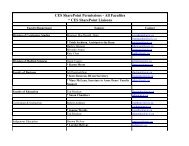Thesis Statements - University of Victoria
Thesis Statements - University of Victoria
Thesis Statements - University of Victoria
You also want an ePaper? Increase the reach of your titles
YUMPU automatically turns print PDFs into web optimized ePapers that Google loves.
<strong>Thesis</strong> <strong>Statements</strong><br />
What is a thesis statement<br />
A thesis statement is usually one concise sentence that tells readers what your argument is and how<br />
you plan to shed light on your topic. It traditionally occurs after a more general statement <strong>of</strong> introduction<br />
in the first paragraph <strong>of</strong> your essay. It may be useful to think <strong>of</strong> the thesis statement as a road map that<br />
familiarizes your reader with the territory that will be explored in the body <strong>of</strong> your essay. It is important<br />
to distinguish the thesis from the general topic or subject <strong>of</strong> your paper. For example, World War I might<br />
be your subject; however, your thesis should answer a specific question about World War I that can be<br />
both contested by others and backed up with evidence. The thesis will vary in scope and complexity<br />
depending on the length <strong>of</strong> your paper. Any assignment that asks you to analyze, interpret, argue, or<br />
compare and contrast is asking you to develop a thesis and support it.<br />
How do I develop a thesis statement<br />
Often your assignment will help to narrow your topic, but the development <strong>of</strong> a strong thesis usually<br />
occurs during the process <strong>of</strong> researching and drafting your essay. While you gather information, you<br />
will begin to see relationships between known facts. These connections – whether contrasts or<br />
similarities – will help you to develop an opinion about your topic, and this will be the foundation for your<br />
“working thesis,” or basic argument.<br />
There are many techniques for brainstorming that can help you to develop a “working thesis.” One<br />
approach is to ask yourself a number <strong>of</strong> “how” and “why” questions about an aspect <strong>of</strong> your topic that<br />
you find interesting or surprising, or that you disagree with. What are the implications <strong>of</strong> your findings<br />
Once you have some provocative questions, try answering some <strong>of</strong> them with persuasive or<br />
argumentative statements. Remember that such a statement will be a “working thesis,” meaning that it<br />
will need to be revised as you become more familiar with your sources and accumulate evidence both<br />
for and against your argument.<br />
How do I strengthen my thesis statement<br />
• Feedback from others can help you to clarify what you really want to say, as opposed to what<br />
you think your thesis is saying. You can get feedback from other students, from your instructor,<br />
or by making an appointment at The Writing Centre.<br />
• You can also evaluate your own writing by asking the following questions:<br />
o Is my position contestable If everyone agrees with your argument then it will be more<br />
like a summary <strong>of</strong> well-known facts. If this is the case, your reader will likely judge it as<br />
weak. You can strengthen your thesis by anticipating and dismantling counter arguments<br />
throughout your essay.<br />
o Is it specific If you find vague words in your thesis statement like “interesting” or<br />
“important,” you should ask yourself why it is interesting or important and incorporate<br />
those specific reasons into your statement.<br />
o Is my thesis supported by my essay Often your essay will diverge slightly from your<br />
original thesis statement. If this happens, you can change your thesis to better reflect<br />
what you actually wrote.<br />
o Is my thesis clear After reading your introduction, will your reader be able to tell you<br />
what your essay is about If not, you may need to use more specific and clear language.<br />
Try rephrasing your thesis statement out loud beginning with the words “My paper is<br />
Brenda Proctor & Tusa Shea, 2008 TWC, <strong>University</strong> <strong>of</strong> <strong>Victoria</strong> Page 1
<strong>Thesis</strong> <strong>Statements</strong><br />
about…” Is this the same as what you wrote If you can’t explain your thesis statement<br />
out loud, then you should revise your written version.<br />
Example: the evolution <strong>of</strong> a thesis statement<br />
Suppose you take a course on 20th-Century Canadian History, and your first assignment asks you to<br />
analyze the effects <strong>of</strong> World War I on Canadian nationalism. You sit down and write the following:<br />
World War I affected Canadian nationalism in many ways.<br />
This weak thesis tells the reader only that the topic <strong>of</strong> your paper is the effect <strong>of</strong> World War I on<br />
Canadian nationalism. Ask yourself questions about the topic: What was nationalism like before the<br />
war How did it change after the war Why What is nationalism Did all Canadians experience the<br />
same form <strong>of</strong> nationalism As you begin to research these types <strong>of</strong> questions you will begin to develop<br />
an argument that will require a specific analysis. Through research you find out that the battle at Vimy<br />
Ridge was a defining moment <strong>of</strong> national pride during the war. You write:<br />
The battle <strong>of</strong> Vimy Ridge in Northern France on April 9, 1917, where Canadian soldiers won more ground than the British<br />
ever had, was a defining moment that encouraged Canadian national pride.<br />
Now you have narrowed your topic down to a specific event within World War I. As you continue to<br />
research, however, you find out that only English-speaking Canadian soldiers experienced this<br />
national pride. Why This question may lead you to a stronger thesis because it is generally accepted<br />
that the victory at Vimy Ridge enhanced Canadian nationalism, so your above statement is still on the<br />
weak side. You write:<br />
After the battle <strong>of</strong> Vimy Ridge, Canadian nationalism surged; however, even though English-speaking soldiers experienced<br />
a defining moment <strong>of</strong> national solidarity and pride, the minority group <strong>of</strong> French-speaking soldiers continued to oppose the<br />
war.<br />
You would need to continue refining and strengthening this statement as you draft your essay, but it is<br />
a good “working thesis” from which to embark. You might ask yourself if other minority groups in<br />
Canada opposed the war, and you might begin to outline why you think minority groups continued to<br />
oppose the war. By continuing to question your thesis statement you will come up with a stronger<br />
argument, and a more resonant paper.<br />
Works Consulted:<br />
Best, Michael, et al. A Writer’s Guide. <strong>Victoria</strong>: UVic English dept, 1997.<br />
Booth, Wayne C., Gregory G. Colomb, and Joseph M. Williams. The Craft <strong>of</strong> Research<br />
<strong>University</strong> <strong>of</strong> Chicago Press, 1995.<br />
Chicago: The<br />
Buckley, Joanne. “Devising a <strong>Thesis</strong>,” Fit to Print: The Canadian Student’s Guide to Essay Writing. Toronto:<br />
Harcourt Brace & Company, 1998, 6-11.<br />
“<strong>Thesis</strong> <strong>Statements</strong>,” The Writing Center, <strong>University</strong> <strong>of</strong> North Carolina at Chapel Hill,<br />
http://www.unc.edu/depts/wcweb/handouts/thesis.html.<br />
Brenda Proctor & Tusa Shea, 2008 TWC, <strong>University</strong> <strong>of</strong> <strong>Victoria</strong> Page 2


